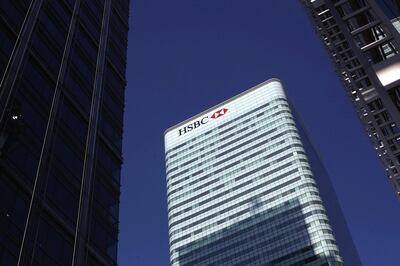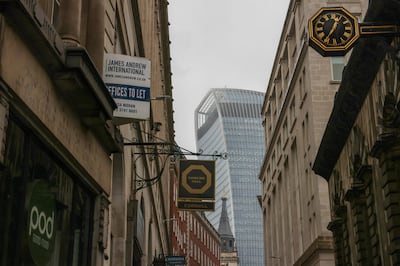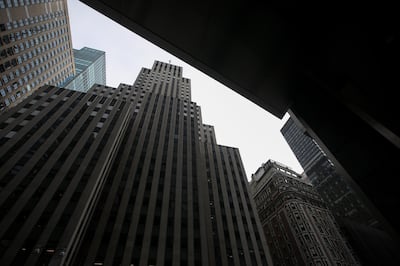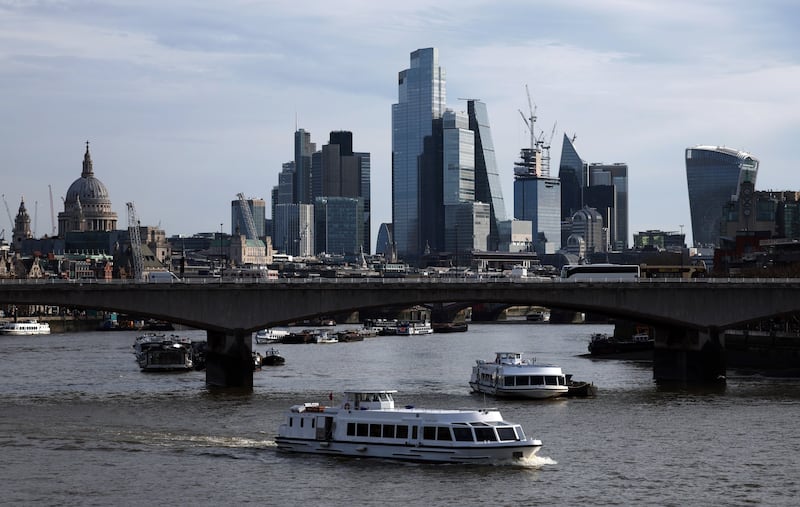Filling London's offices has been an uphill task in recent years, with 2023 being particularly miserable.
According to figures from BNP Paris Real Estate and MSCI, investment in commercial real estate (CRE) in the UK as a whole laboured last year to achieve £38 billion ($48.23 billion), almost half the figure reached in 2022.
Office occupancy rates struggled and by September there was talk of a "rental recession" in London's prime office markets of the West End, the City and Canary Wharf in the Docklands area to the east.
As metaphorical tumbleweed blew through some of London's prime office space, analysts at the American investment bank Jeffries downgraded shares in several of the UK's largest office landlord companies, including British Land and Derwent.
"Retail was technology's first casualty and we think offices are next," a Jefferies research note said at the time.
"Utilisation has shrunk and landlords are losing pricing power as tenants offload surplus space."
But, almost six months later, some are seeing a light at the end of the tunnel.
"Last year was quite sobering," said Vanessa Hale, head of research and insights at BNP Paribas Real Estate. "We did not have a brilliant investment market."

But unlike the UK real estate trends of residential, retail, industrial and hotels, investment in office space actually climbed higher in the final quarter, albeit by a tiny amount, prompting some to speculate that an end to the rental recession might be in the offing.
“We’re quite optimistic for the year," Ms Hale said.
“There’s a lot of confidence that the office market investment world will continue to grow this year.”
London office occupancy rates improved slowly across the course of 2023, according to the consulting firm Remit, although overall the levels were far below what was the norm before the pandemic.
By October, London was experiencing office occupancy rates above 50 per cent, according to Remit's Return Report. Before the pandemic, occupancy rates tended to fluctuate between 60 per cent and 80 per cent.
Many predict that investment will flow back into London's CRE market, because there is now a level of certainty on the direction, if not the timing, of interest rates.
Big global investors do not care about when interest rates are going to go down, because they know that they will eventually, according to Giulio Baratta, head of DMC Corporates EMEA at BNP Paribas.
“Investors are focusing more than what we expected a few months ago into some of the asset classes that (a) where repriced through the last couple of years and got cheaper to buy and (b) into the sectors that are more dependent on the fixed income and interest rate cycle – one is infrastructure, the other is real estate,” he said.
Jobs equal demand
While the number of available jobs and those seeking them both fell during 2023, according to analysts at Morgan McKinsey, a pick-up in London's employment figures is expected by the second half of this year.
“The job growth forecast [for London] is going to outperform Paris, Berlin and Frankfurt in four of the next five years," said Argie Taylor, head of International Investment Group at BNP Paribas Real Estate. "That’s good; that’s demand embedded."
In addition to a modest increase in jobs, many companies are now either ordering or enticing their staff to come into the office more often.
The trend over 2023 was to move from three days in the office to four days.
"Hybrid working for office-based staff is the new normal," said Lorna Landells of Remit Consulting.
"Despite the insistence by some high-profile businesses that staff should return to their desks full time, this is clearly not happening universally."
Figures from Transport for London show that commuting levels are far lower on Fridays than was the case prior to the pandemic and serve as just one illustration how hybrid working is now part of the working landscape.
It's also shaping the decisions some of London's major companies are making.

Last year, the global banking company HSBC decided to move from its monolithic headquarters at Canary Wharf in Docklands, in the east of London, to the City.
By 2027, when the move is expected to be completed, HSBC will have swapped 102,000 square metres of office space in Canary Wharf for 52,000 square metres at the Panorama St Paul's development in the City of London.
HSBC is not the only major corporation looking to reduce its office space as demand becomes reshaped by hybrid working patterns, carbon-reducing requirements and employee desires.
A survey by property agent Knight Frank last year found half the world's big employers plan to shrink their office space by between 10 per cent and 20 per cent over the next three years.
For Mr Taylor, the whole concept of hybrid working needs to be about balance and negotiation.
“I think it could be damaging for a corporate to turn around and say ‘you need to be in the office five days a week’ and put it into their contracts, like it was for all of us 20 years ago," he said in response to a question from The National.
"But if you say less than three days a week, you’re also impacting your corporate culture. I think it’s got to be a hybrid set-up. It’s got to be worth people coming into the office and when they’re at home they’ve actually got to have a productive day.”
'There is a lack of supply coming'
The opportunity for investors in London's office market lies in the confluence of two factors: the growth of jobs and the supply of space. As far as BNP Paribas's analysis is concerned, as they move in opposite directions, rents will increase.
About 40 per cent of all office properties in development in the City of London have been pre-let and there's nothing coming down the pipeline in the next few years that hasn't already been snapped up, according to Mr Taylor.
“There is a lack of supply coming. We’ve got resilient jobs growth, so, there is going to be a longer-term supply shortage. There’s a flight to prime – you can’t buy endless buildings on Gresham Street or Bond Street.
"There is limitation; there is scarcity in the prime locations and, therefore, there is only upward pressure on rents.”

Prime is the key. Rental money is chasing prime offices in London, and while years ago that just meant an address, nowadays it includes amenities for staff and compliance with regulations over carbon footprints.
According to Oktra's London Office Rent Report, a limited supply of best-in-class spaces has led to "further growth in London’s prime rent", with rents in the West End now reaching £135 per square foot and those in the financial district of the City at £77.50 per square foot.
For Mr Taylor, as far as best-in-class Grade A office rentals in the City of London are concerned, that spells built-in demand for the future.
“To build a building that is green and has amenities means the rents will go up," he said.
"To build a brand-new office building in the City, you need an average rent of £85 per square foot. Prime rents are now £77 per square foot – so, that’s an embedded 12 per cent growth.
"Which is why supply is dipping down."
Number-crunching by the commercial real estate agents Cushman & Wakefield concluded that the City of London had its best quarter of office leasing activity since 2006 in the final three months of last year, largely driven by HSBC's decision to move.
“The strong take-up figures in 2023, particularly in the final quarter, reflect the ongoing attractiveness of London's office market to occupiers," said Ben Cullen, head of UK Offices at Cushman & Wakefield.
"Despite economic challenges, leasing activity has held up well, especially for Grade A space. With active requirements at record levels but constraints on new supply, we expect competition amongst tenants for the highest quality space to intensify further in 2024.”
Concerns across the Atlantic
Nonetheless, the expectation that London's prime office rental market is set for take-off should be tempered with some caveats, not least the possibility of shocks to an already battered UK economy.
There are also concerns coming from the other side of the Atlantic where some experts predict that if the commercial real estate market in the US continues to get more distressed and default levels rise sharply, another banking crisis could be triggered.

Higher interest rates and falling property values mean the risk that loans go "underwater" increases, which creates a scenario similar to the collapse of Silicon Valley Bank last year.
But Richard Choi, head of real estate advisory at BNP Paribas, feels that significant defaults on loans in London are unlikely.
"Our sector did learn a lesson from the last downturn, which was not to be over-leveraged," he said.
"We haven’t seen any major distress come through. As of yet we haven’t seen a huge wave of non-performance. I'm not suggesting that won’t come, but it’s certainly not our base case.”
There are many elements at play in London office space at the moment and many more that seem to be waiting in the wings for 2024. If the optimists are right, investors in prime CRE in central London could be set for a much more promising year than last year.
In its recent guide to office rents in London, the workplace specialists K2 Space said the cost of office space in 2023 "shows a complex landscape, undergoing transformative changes that echo global shifts in work culture, technology and an increased interest in sustainability".
Usually a growing population and limited space would continue to push demand for all types of real estate higher. But the new world of work and prescriptions for green buildings are tweaking that assumption at the edges in a way that commands investors to be more savvy and more circumspect.
While the light at the end of the tunnel looks dim, many of those involved in London's CRE market will be hoping investors continue to take heed of a quip made about 100 years ago by actor and social commentator Will Rogers: “Don’t wait to buy real estate, buy real estate and wait.”







